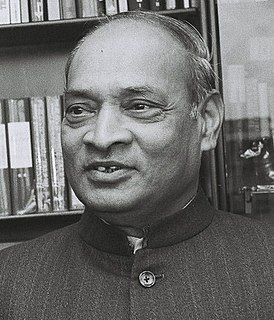Top 2 Quotes & Sayings by P. V. Narasimha Rao

Pamulaparthi Venkata Narasimha Rao was an Indian lawyer and politician who served as the 9th Prime Minister of India from 1991 to 1996. He is often referred to as the "Father of Indian Economic Reforms". His ascendancy to the prime ministership was politically significant in that he was the second holder of this office from a non-Hindi-speaking region and the first from South India. He led an important administration, overseeing a major economic transformation and several home incidents affecting national security of India. Rao, who held the Industries portfolio, was personally responsible for the dismantling of the Licence Raj, as this came under the purview of the Ministry of Commerce and Industry, reversing the economic policies of Rajiv Gandhi's government. Future prime ministers Atal Bihari Vajpayee and Manmohan Singh continued the economic reform policies pioneered by Rao's government. He employed Manmohan Singh as his Finance Minister to embark on historic economic transition. With Rao's mandate, Manmohan Singh launched India's globalisation angle of the reforms that implemented the International Monetary Fund (IMF) policies to rescue the almost bankrupt nation from economic collapse. Rao was also referred to as Chanakya for his ability to steer economic and political legislation through the parliament at a time when he headed a minority government.
Related Authors































